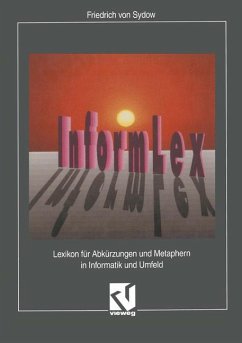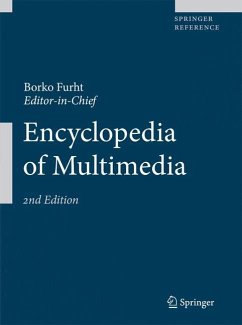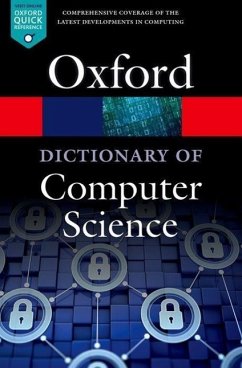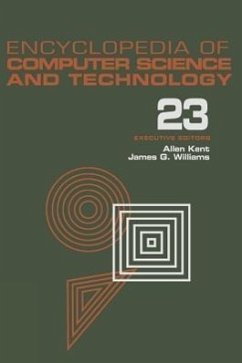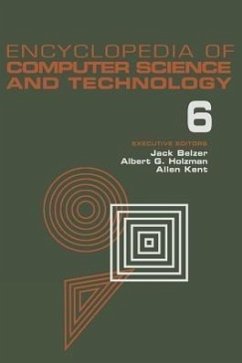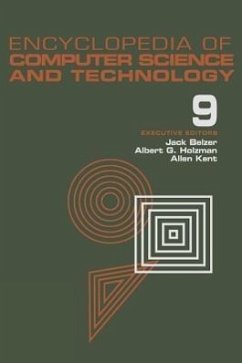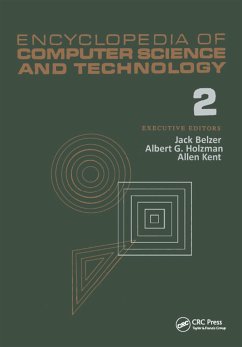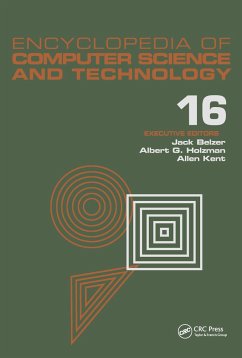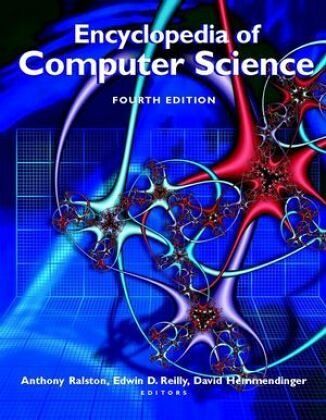
Encyclopedia of Computer Science
Versandkostenfrei!
Versandfertig in über 4 Wochen
265,99 €
inkl. MwSt.

PAYBACK Punkte
133 °P sammeln!
The Encyclopedia of Computer Science is the definitive reference in computer science and technology. First published in 1976, it is still the only single volume to cover every major aspect of the field. Now in its Fourth Edition, this influential work provides an historical timeline highlighting the key breakthroughs in computer science and technology, as well as clear and concise explanations of the latest technology and its practical applications. Its unique blend of historical perspective, current knowledge and predicted future trends has earned it its richly deserved reputation as an unriv...
The Encyclopedia of Computer Science is the definitive reference in computer science and technology. First published in 1976, it is still the only single volume to cover every major aspect of the field. Now in its Fourth Edition, this influential work provides an historical timeline highlighting the key breakthroughs in computer science and technology, as well as clear and concise explanations of the latest technology and its practical applications. Its unique blend of historical perspective, current knowledge and predicted future trends has earned it its richly deserved reputation as an unrivalled reference classic.
What sets the Encyclopedia apart from other reference sources is the comprehensiveness of each of its entries. Encompassing far more than mere definitions, each article elaborates on a topic giving a remarkable breadth and depth of coverage. The visual impact of the volume is enhanced with a 16 page colour insert spotlighting advanced computer applications and computer-generated graphics technology. In addition, the text is enlivened with figures, tables, diagrams, illustrations and photographs.
With contributions from over 300 international experts, the 4th Edition contains over 100 completely new articles ranging from artificial life to computer ethics, data mining to Java, mobile computing to quantum computing and software safety to the World Wide Web. In addition, each of the more than 600 articles have been extensively revised, expanded and updated to reflect the latest developments in computer science and technology.
Intelligently and thoughtfully organised, all the articles are classified around 9 main themes
_ Hardware
_ Software
_ Computer Systems
_ Information and Data
_ Mathematics of Computing
_ Theory of Computation
_ Methodologies
_ Applications
_ Computing Milieux
Within each of these major headings are a wealth of articles that provide the reader with concise yet thorough coverage of the topic. In addition, cross-references are included at the beginning of each article, directing the reader immediately to related material.
In addition the Encyclopedia contains useful appendices including:
_ An expanded glossary of major terms in English, German, Spanish and Russian
_ A revised list of abbreviations and acronyms
_ An updated list of computer science and engineering research journals
_ A list of articles from previous editions not included in the 4th edition
_ A Name Index listing almost 3500 individuals cited in the text
_ A comprehensive General Index with 7000 entries
_ A chronology of significant milestones
_ Computer Society & Academic Computer Science Department Listings
_ Numerical Tables, Mathematical Notation and Units of Measure
Highly-regarded as an essential resource for computer professionals, engineers, mathematicians, students and scientists, the Encyclopedia of Computer Science is a must-have reference for every college, university, business and high-school library
What sets the Encyclopedia apart from other reference sources is the comprehensiveness of each of its entries. Encompassing far more than mere definitions, each article elaborates on a topic giving a remarkable breadth and depth of coverage. The visual impact of the volume is enhanced with a 16 page colour insert spotlighting advanced computer applications and computer-generated graphics technology. In addition, the text is enlivened with figures, tables, diagrams, illustrations and photographs.
With contributions from over 300 international experts, the 4th Edition contains over 100 completely new articles ranging from artificial life to computer ethics, data mining to Java, mobile computing to quantum computing and software safety to the World Wide Web. In addition, each of the more than 600 articles have been extensively revised, expanded and updated to reflect the latest developments in computer science and technology.
Intelligently and thoughtfully organised, all the articles are classified around 9 main themes
_ Hardware
_ Software
_ Computer Systems
_ Information and Data
_ Mathematics of Computing
_ Theory of Computation
_ Methodologies
_ Applications
_ Computing Milieux
Within each of these major headings are a wealth of articles that provide the reader with concise yet thorough coverage of the topic. In addition, cross-references are included at the beginning of each article, directing the reader immediately to related material.
In addition the Encyclopedia contains useful appendices including:
_ An expanded glossary of major terms in English, German, Spanish and Russian
_ A revised list of abbreviations and acronyms
_ An updated list of computer science and engineering research journals
_ A list of articles from previous editions not included in the 4th edition
_ A Name Index listing almost 3500 individuals cited in the text
_ A comprehensive General Index with 7000 entries
_ A chronology of significant milestones
_ Computer Society & Academic Computer Science Department Listings
_ Numerical Tables, Mathematical Notation and Units of Measure
Highly-regarded as an essential resource for computer professionals, engineers, mathematicians, students and scientists, the Encyclopedia of Computer Science is a must-have reference for every college, university, business and high-school library



